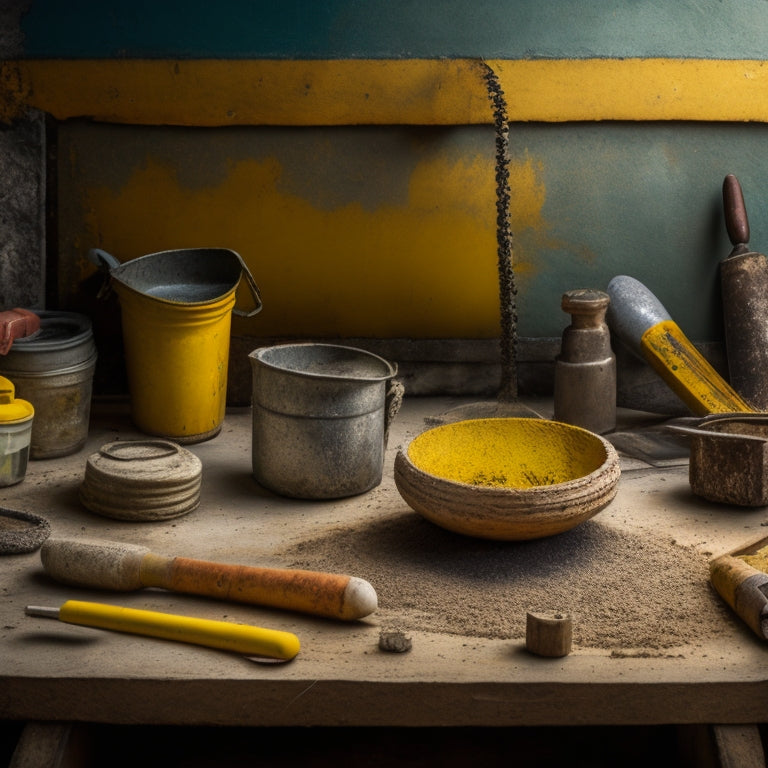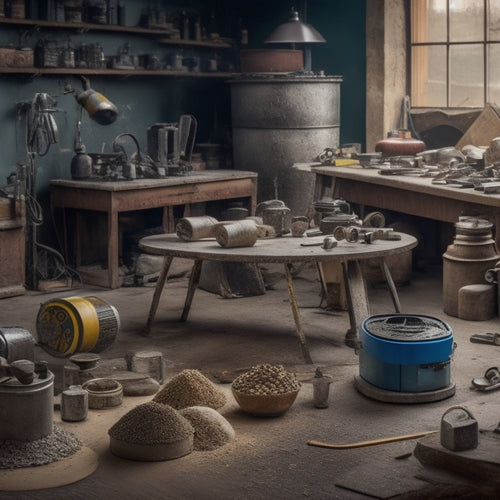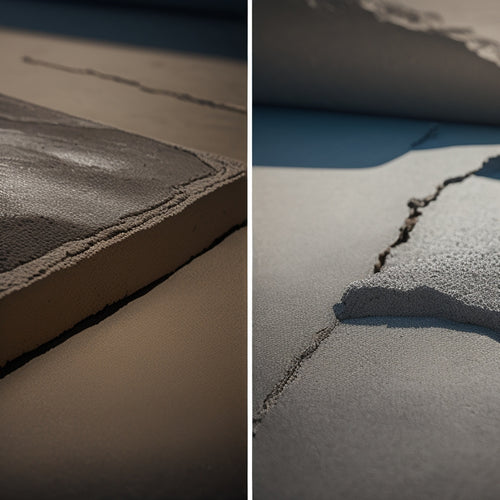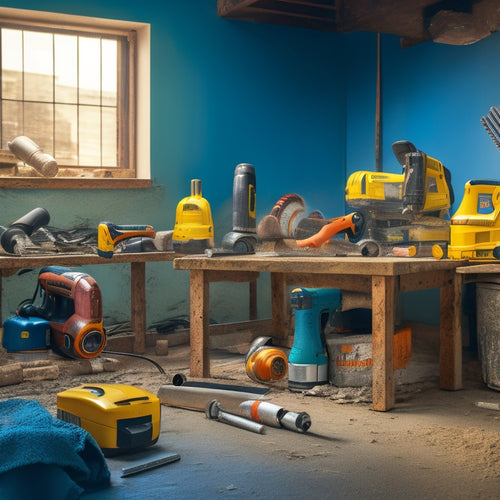
Top 3 Essential Concrete Tools for Homeowners
Share
You'll need three critical tools to achieve a professional-looking concrete finish for your DIY projects: a concrete edger, a float, and a trowel. These must-haves will help you create a smooth, even surface, remove imperfections, and add a polished finish. The edger defines clean edges between concrete and adjacent surfaces, while the float levels and smooths the surface, and the trowel eliminates air pockets and excess water. With these essentials in your toolkit, you'll be well on your way to achieving a professional-grade finish - and with a few more techniques up your sleeve, you'll be able to take your concrete creations to the next level.
Key Takeaways
• A mixing bucket, stick, and trowel are necessary for smooth concrete mixing and a successful DIY project.
• A reliable concrete mixer with adjustable speed settings saves time and ensures consistent results.
• A concrete float is essential for removing imperfections and leveling the surface for a smooth finish.
• An edger creates clean, defined edges between concrete and adjacent surfaces for a professional-grade look.
• Regular tool maintenance is crucial to extend the lifespan of your tools and prevent rust.
Essential Tools for Finishing Concrete
When finishing concrete, you'll need a set of specialized tools to achieve a smooth, even surface, and the right edger is essential for creating a clean, defined edge. This tool helps you create a seamless shift between the concrete and adjacent surfaces, such as sidewalks or walls.
In order to achieve a high-quality finish, you'll also need to master various smoothing techniques, including tamping, floating, and troweling. These techniques help remove imperfections, air pockets, and excess water from the surface, resulting in a smooth, even finish.
In addition to edgers and smoothing tools, you'll need to evaluate surface treatments to protect and enhance your concrete. These can include sealers, coatings, and finishes that provide durability, stain resistance, and aesthetic appeal.
Achieving Professional-Grade Finishes
With the right combination of tools and techniques, you can achieve a professional-grade finish that rivals that of a seasoned contractor.
To get started, focus on creating a smooth, even surface. This is essential for achieving a polished finish. Use a concrete float to remove any imperfections and leave a smooth, level surface.
Next, apply a texture to the surface using a texture mat or stamp. This will give your concrete a unique, high-end look. For added depth and visual interest, experiment with different texture application techniques, such as applying the texture in a specific pattern or using multiple textures in a single design.
Once you've achieved the desired texture, it's time to add the finishing touches. Use a concrete sealer to protect the surface from stains and damage. Additionally, consider applying a decorative coating or stain to enhance the color and appearance of the concrete.
With these techniques and the right tools, you can achieve a polished surface that's sure to impress. By following these steps and paying close attention to detail, you'll be able to achieve a professional-grade finish that will make your DIY project look like a pro's work.
Must-Have Tools for DIY Projects
You'll need a solid arsenal of specialized tools to tackle your DIY concrete project, and investing in the right equipment will greatly improve the quality of your results.
Concrete mixing, for instance, requires a sturdy mixing bucket, a mixing stick, and a trowel to achieve a smooth, even finish.
Don't overlook the importance of tool maintenance, either - regular cleaning and lubrication will extend the lifespan of your tools and prevent rust.
A reliable concrete mixer is another must-have for any DIY concrete project. Whether you're working with a small patch or a large slab, a mixer will save you time and effort by efficiently blending cement, sand, and water.
Look for a mixer with adjustable speed settings and a sturdy drum to guarantee consistent results.
Additionally, a set of finishing tools, such as edgers, floats, and trowels, will help you achieve a professional-grade finish.
By investing in these essential tools, you'll be well-equipped to tackle your DIY concrete project with confidence and precision.
With the right tools and a bit of practice, you'll be able to produce high-quality results that will last for years to come.
Frequently Asked Questions
How Do I Properly Clean and Maintain My Concrete Tools?
When it comes to cleaning and maintaining your concrete tools, you'll want to adopt effective cleaning techniques to extend tool longevity.
Start by removing any excess concrete from your tools using a wire brush or scraper.
Then, wash them with soap and water, and dry thoroughly to prevent rust.
Regularly lubricate moving parts and store tools in a dry place to prevent corrosion.
Can I Use Concrete Tools for Other Construction Materials?
As you venture beyond concrete, you wonder: can your trusty tools handle alternative materials? The answer is, it depends.
You'll be relieved to know that many of your concrete tools boast impressive versatility. Your trowel, for instance, can smoothly shift to applying adhesives or leveling drywall.
However, it's important to point out that certain tools, like your edger, are concrete-specific.
Research the manufacturer's guidelines to guarantee you're using your tools safely and effectively on other construction materials.
What Safety Gear Should I Wear When Working With Concrete?
When working with concrete, you'll need to prioritize your safety.
You should wear essential safety equipment, including gloves to prevent skin irritation, safety glasses or goggles to protect your eyes from debris, and a dust mask to avoid inhaling concrete dust.
Additionally, don't forget to wear long sleeves, pants, and closed-toe shoes to prevent skin exposure.
This protective gear will help you avoid injuries and guarantee a safe working environment.
How Do I Store Concrete Tools to Prevent Damage?
When you're not using your concrete tools, you'll want to store them properly to prevent damage.
You should prioritize tool organization and invest in storage solutions that protect your gear.
Clean and dry your tools before storing them in a cool, dry place.
Consider using a tool chest or toolbox with separate compartments to keep items organized and easy to find.
This will help extend the life of your tools and guarantee they're ready for the next project.
Are Concrete Tools Suitable for Beginners With No Experience?
As a beginner, you're probably wondering if concrete tools are suitable for you, despite having no experience.
The good news is that with the right beginner tips and tool selection, you can confidently tackle concrete projects.
Start by choosing tools with ergonomic handles and intuitive designs, which will make it easier to learn and use them.
Conclusion
As you wrap up your DIY concrete project, remember that having the right tools is essential to achieving a professional-grade finish.
According to the National Association of Home Builders, 70% of homeowners undertake DIY projects to save money, but using subpar tools can lead to costly mistakes.
With the top 3 essential concrete tools in your arsenal, you'll be well on your way to a flawless finish that will make your neighbors green with envy.
Related Posts
-

Top DIY Concrete Grinding and Polishing Tools
When selecting DIY concrete grinding and polishing tools, you'll want to take into account a range of factors to guar...
-

What Tools Ensure Strong Concrete Adhesion at Home
You'll need the right tools to guarantee strong concrete adhesion at home. For surface preparation, use concrete surf...
-

Essential Power Tools for Concrete Block Construction
When building with concrete blocks, you'll need a range of power tools to cut, drill, mix, and finish the blocks to g...


